Kurose Castle
-Main base of local lords purged by central magistrate (1)-
Overview
Name: Kurose castle (Kurose-jo)
Alias:
Place: Uwacho Seiyo city, Ehime
Location: 33.35968348602647, 132.50586830556077
Type: Mountain Castle
Built: Around 1550
Remaining remnants: Clay walls, stone walls and dry moats
Title:
Kurose castle (黒瀬城) is located over Kurose-yama mountain, one of about 100 meter height from hillside at the north of Uwa Undo Koen park near the center of current Seiyo city central. City central spreads over eastern riverside of Hiji-kawa river over 2 kilometers, and castle site is at the opposite of the river and can look at whole part of city central.
Castle site is a meeting point of Hiji-kawa river and its tributary Iwase-gawa river, which form Seiyo basin spreads over about 4 kilometer square at most upstream of Hiji-kawa river which runs roundly at the western edge of Shikoku mountain.
The basin itself is not so large but it is an important path connects north half of Ehime prefecture such as Matsuyama area and south half including Uwajima area, along with Ozu basin at the middle part of Hiji-kawa river. Even now roads and railways run along with narrow valley of the basin.
Precise year is unknown but Kurose castle was built in the middle of 16th century by local lord Saionji clan as its main base. Saionji clan was a branch family of central noble Saionji family, which continues over 1,000 years and turned out Kinmochi Saionji (1849-1940) who served Prime Minister several times between WW1 and WW2 then called as “Last Elder Statesman”.
Saionji clan was originally a middle class noble but promoted to highest class under Kintsune Saionji (1171-1244), who was close to Kamakura Shogunate and contributed to its victory at the battle of Jokyu against ex-Emperor Gotoba occurred in 1221. Under the power of Shogunate, Saionji clan captured Seiyo area as their manor.
But at the fall of Kamakura Shogunate in 1333, Saionji clan at first opposed to Kenmu New Government formed by Emperor Godaigo (1288-1339) but later followed to it. But Kenmu New Government lost the power before Muromachi Shogunate established by Takauji Ashikaga (1305-1358), thus Saionji clan significant lost its power by belonging to loser side twice.
Under such situation, to protect their manor under loss of authority and decrease the personnel expense of main family, Saionji family sent their relative to Seiyo area and formed Saionji clan as local lord. Saionji clan at first built Matsuba castle at the opposite of Hiji-kawa river and managed Seiyo area.
Around the same time, at Ozu basin located just at the north of Seiyo basin, Utsunomiya clan was appointed as the governor of Iyo province (Ehime prefecture) by Kamakura Shogunate and entered into the basin and resided at Jizogatake castle (current Ozu castle). Utsunomiya clan stayed at small local lord at Iyo province, then Saionji clan and Utsunomiya clan became fatal rival at the south half of the province.
Being limited its northward by Utsunomiya clan, Saionji clan gradually expanded southward where no large lord exists. Saionji clan advanced into Uwajima area then placed its branch family at Marukushi castle (current Uwajima castle), and gathered small local lords of the area such as Doi clan of Omori castle, Hoketsu clan of Hoketsu castle or Watanabe clan of Kagomori castle as “Saionji Jugosho” (15 lords of Saionji clan).
At the beginning of 16th century, the territory of Saionji clan spreads 20 kilometer square around current Seiyo and Nanyo area. As Kono clan which was nominal governor of Iyo province could not exercise its power at south part of the province, Saionji clan served as independent feudal lord even if small. This time might be the peak of Saionji clan.
But in reversal, Saionji clan became to be involved into severe conflict between large lords. After the collapse of Ouchi clan which was the strongest feudal lord in western Japan in 1551, Mouri clan which was the lord of Aki province (Hiroshima prefecture) and captured the territory of Ouchi clan, and Otomo clan which was the lord of Bungo province (Oita prefecture) fiercely struggled for the north part of Kyushu region including Hakata port.
At Iyo province, Mouri clan and Otomo clan formed their second front line cooperating local powers. Mouri clan which cooperated with Murakami Navy supported Kono clan as Kono clan also connected with Murakami navy, and to cope with this alliance Otomo clan supported Ichijo clan, which was the lord of Tosa Nakamura castle (Kochi prefecture) of Tosa province (Kochi prefecture).
Ichijo clan was a descendant of central noble Ichijo family and moved to local manor same as Saionji clan, but stronger because of larger territory and naval trade at Nakamura port. Ichijo clan expanded its fourth leader Fusamoto Ichijo (1522-1549) and started to expand into south part of Iyo province. To cope with intrusion of external power, Saionji clan built Kurose castle as their new main base and moved.
Kurose castle spreads over a long and narrow ridge spreads east and west. Central area of the castle is a narrow triangle shaped one of about 100 meter long and 30 meter wide, which is encircled by clay wall and has basement of building at its backside at western edge. At the west of central area, there is a large dry moat which separates the castle from backside mountain.
At the east of central area, there is line of flat terraces to the edge of the mountain. North and south side of the castle is protected by the line of horizontal dry moat or clay wall, which is advanced technology of the era. But gate of the castle is a simple flat one and not so secure.
Compared with former main base Matsuba castle, Kurose castle has well shaped areas. But Matsuba castle stands higher place and secure gate shaped by stone walls, Kurose castle might be the move of hillside residence to secure place, and Matsuba castle was also kept as military base for the final fort.
Since the middle of 16th century, Saionji territory was frequently attacked by external powers as expected. Otomo clan and Ichijo clan intruded into Saionji territory several times in 1560’s and once directly attacked Kurose castle. But Kinhiro Saionji (1537-1588), the leader of Saionji clan, barely rejected the attack of Otomo army at Kurose castle.
In 1568, Ichijo clan made large attack to Saionji clan, in cooperation with Utsunomiya clan. This was an attack to Saionji clan but also a challenge to Kono clan, thus Takakage Kobayakawa (1533-1597), the second son of Motonari Mouri (1497-1571), lead large army to Iyo province to support Kono clan.
At this battle Saionji clan allied with Mouri clan and Kono clan then finally broke Ichijo army and Utunomiya army then Saionji clan survived. Ichijo clan significantly lost their power at this defeat then could not invade into Iyo province any more, but Motochika Chosokabe (1539-1599) followed Ichijo clan left it and started his campaign.
10 years after that, Motochika Chosokabe who broke Ichijo clan at the battle of Shimanto-gawa in 1575 and united Tosa province, aggressively attacked surrounding provinces. Motochika sent his general Chikanobu Hisatake (?-1579) as the commander at Iyo province and attacked Saionji clan.
Saionji clan struggled against overwhelming Chosokabe army, and Chikanobu Hisatake died in the battle of Okamoto castle before sudden attack of Kiyoyoshi Doi in 1579. But the difference of both powers became greater and greater, then Saionji clan finally surrendered to Chosokabe clan in 1584.
However, next year central ruler Hideyoshi Toyotomi (1537-1598) attacked Chosokabe clan by huge army. Front line of Chosokabe clan easily collapsed then Motochika surrendered to Hideyoshi only in three month. Iyo province was confiscated and once given to Takakage Kobayakawa, and Kinhiro Saionji only kept Kurose castle.
After the Kyushu campaign in 1587, Kobayakawa clan moved to Chikuzen province (Fukuoka prefecture), and Iyo castle was governed separately by hereditary generals of Hideyoshi. Ozu area and Seiyo area was given to Katsutaka Toda (?-1594). As existence of former lord was obstacle to Katsutaka, Katsutaka forced Kinhiro Saionji to leave Kurose castle then Kinhiro once retired.
But opposing to the severe government of Toda clan, former retainer of Saionji clan raised and attacked Ozu castle and Uwajima castle. Katsutaka who broke this raising decided to purge Kinhiro Saionji, the invited Kinhiro and assassinated. Kinhiro expected this prepared farewell poem and bravely fought then died, then history of Saionji clan at Iyo province ended after 350 year from its entrance. Kurose castle was used as branch castle for a while but soon abolished.
Currently no building remain but structure of the castle well remain on the mountain. Even not so large and not at secure place, well built defense facilities shows the reason to stop overwhelming army, being supported at distant place from the enemy territory. The shape of the castle shows the situation of Saionji clan, a small lord barely survived tough situation but finally disappeared into the history.
20 minutes walk from JR West Yosan-sen line Unomachi Station to Uwa Undo Koen park. 10 minutes drive from Matsuyama Jidoshado Expressway Seiyo-Uwa interchange to the parking of the park. 20 minutes walk from park to hilltop castle.
Uwajima Castle -White elegant main tower looking down on port-
Kagomori Castle -Castle like water dragon lives clear stream-
Ozu castle -Final winner among seven braves at Shizugatake-
Nakamura Castle (Tosa) -History of island hero (5) Beat of benefactor-
Type: Mountain Castle
Built: Around 1550
Remaining remnants: Clay walls, stone walls and dry moats
Title:
Brief History
Kurose castle (黒瀬城) is located over Kurose-yama mountain, one of about 100 meter height from hillside at the north of Uwa Undo Koen park near the center of current Seiyo city central. City central spreads over eastern riverside of Hiji-kawa river over 2 kilometers, and castle site is at the opposite of the river and can look at whole part of city central.
Castle site is a meeting point of Hiji-kawa river and its tributary Iwase-gawa river, which form Seiyo basin spreads over about 4 kilometer square at most upstream of Hiji-kawa river which runs roundly at the western edge of Shikoku mountain.
The basin itself is not so large but it is an important path connects north half of Ehime prefecture such as Matsuyama area and south half including Uwajima area, along with Ozu basin at the middle part of Hiji-kawa river. Even now roads and railways run along with narrow valley of the basin.
Origin of Saionji clan
Precise year is unknown but Kurose castle was built in the middle of 16th century by local lord Saionji clan as its main base. Saionji clan was a branch family of central noble Saionji family, which continues over 1,000 years and turned out Kinmochi Saionji (1849-1940) who served Prime Minister several times between WW1 and WW2 then called as “Last Elder Statesman”.
Saionji clan was originally a middle class noble but promoted to highest class under Kintsune Saionji (1171-1244), who was close to Kamakura Shogunate and contributed to its victory at the battle of Jokyu against ex-Emperor Gotoba occurred in 1221. Under the power of Shogunate, Saionji clan captured Seiyo area as their manor.
But at the fall of Kamakura Shogunate in 1333, Saionji clan at first opposed to Kenmu New Government formed by Emperor Godaigo (1288-1339) but later followed to it. But Kenmu New Government lost the power before Muromachi Shogunate established by Takauji Ashikaga (1305-1358), thus Saionji clan significant lost its power by belonging to loser side twice.
Growth of Saionji clan
Under such situation, to protect their manor under loss of authority and decrease the personnel expense of main family, Saionji family sent their relative to Seiyo area and formed Saionji clan as local lord. Saionji clan at first built Matsuba castle at the opposite of Hiji-kawa river and managed Seiyo area.
Around the same time, at Ozu basin located just at the north of Seiyo basin, Utsunomiya clan was appointed as the governor of Iyo province (Ehime prefecture) by Kamakura Shogunate and entered into the basin and resided at Jizogatake castle (current Ozu castle). Utsunomiya clan stayed at small local lord at Iyo province, then Saionji clan and Utsunomiya clan became fatal rival at the south half of the province.
Being limited its northward by Utsunomiya clan, Saionji clan gradually expanded southward where no large lord exists. Saionji clan advanced into Uwajima area then placed its branch family at Marukushi castle (current Uwajima castle), and gathered small local lords of the area such as Doi clan of Omori castle, Hoketsu clan of Hoketsu castle or Watanabe clan of Kagomori castle as “Saionji Jugosho” (15 lords of Saionji clan).
Build for approaching threat
At the beginning of 16th century, the territory of Saionji clan spreads 20 kilometer square around current Seiyo and Nanyo area. As Kono clan which was nominal governor of Iyo province could not exercise its power at south part of the province, Saionji clan served as independent feudal lord even if small. This time might be the peak of Saionji clan.
But in reversal, Saionji clan became to be involved into severe conflict between large lords. After the collapse of Ouchi clan which was the strongest feudal lord in western Japan in 1551, Mouri clan which was the lord of Aki province (Hiroshima prefecture) and captured the territory of Ouchi clan, and Otomo clan which was the lord of Bungo province (Oita prefecture) fiercely struggled for the north part of Kyushu region including Hakata port.
At Iyo province, Mouri clan and Otomo clan formed their second front line cooperating local powers. Mouri clan which cooperated with Murakami Navy supported Kono clan as Kono clan also connected with Murakami navy, and to cope with this alliance Otomo clan supported Ichijo clan, which was the lord of Tosa Nakamura castle (Kochi prefecture) of Tosa province (Kochi prefecture).
Ichijo clan was a descendant of central noble Ichijo family and moved to local manor same as Saionji clan, but stronger because of larger territory and naval trade at Nakamura port. Ichijo clan expanded its fourth leader Fusamoto Ichijo (1522-1549) and started to expand into south part of Iyo province. To cope with intrusion of external power, Saionji clan built Kurose castle as their new main base and moved.
Structure of Kurose castle
Kurose castle spreads over a long and narrow ridge spreads east and west. Central area of the castle is a narrow triangle shaped one of about 100 meter long and 30 meter wide, which is encircled by clay wall and has basement of building at its backside at western edge. At the west of central area, there is a large dry moat which separates the castle from backside mountain.
At the east of central area, there is line of flat terraces to the edge of the mountain. North and south side of the castle is protected by the line of horizontal dry moat or clay wall, which is advanced technology of the era. But gate of the castle is a simple flat one and not so secure.
Compared with former main base Matsuba castle, Kurose castle has well shaped areas. But Matsuba castle stands higher place and secure gate shaped by stone walls, Kurose castle might be the move of hillside residence to secure place, and Matsuba castle was also kept as military base for the final fort.
Struggle with Ichijo clan
Since the middle of 16th century, Saionji territory was frequently attacked by external powers as expected. Otomo clan and Ichijo clan intruded into Saionji territory several times in 1560’s and once directly attacked Kurose castle. But Kinhiro Saionji (1537-1588), the leader of Saionji clan, barely rejected the attack of Otomo army at Kurose castle.
In 1568, Ichijo clan made large attack to Saionji clan, in cooperation with Utsunomiya clan. This was an attack to Saionji clan but also a challenge to Kono clan, thus Takakage Kobayakawa (1533-1597), the second son of Motonari Mouri (1497-1571), lead large army to Iyo province to support Kono clan.
At this battle Saionji clan allied with Mouri clan and Kono clan then finally broke Ichijo army and Utunomiya army then Saionji clan survived. Ichijo clan significantly lost their power at this defeat then could not invade into Iyo province any more, but Motochika Chosokabe (1539-1599) followed Ichijo clan left it and started his campaign.
Follow to Chosokabe clan and Toyotomi government
10 years after that, Motochika Chosokabe who broke Ichijo clan at the battle of Shimanto-gawa in 1575 and united Tosa province, aggressively attacked surrounding provinces. Motochika sent his general Chikanobu Hisatake (?-1579) as the commander at Iyo province and attacked Saionji clan.
Saionji clan struggled against overwhelming Chosokabe army, and Chikanobu Hisatake died in the battle of Okamoto castle before sudden attack of Kiyoyoshi Doi in 1579. But the difference of both powers became greater and greater, then Saionji clan finally surrendered to Chosokabe clan in 1584.
However, next year central ruler Hideyoshi Toyotomi (1537-1598) attacked Chosokabe clan by huge army. Front line of Chosokabe clan easily collapsed then Motochika surrendered to Hideyoshi only in three month. Iyo province was confiscated and once given to Takakage Kobayakawa, and Kinhiro Saionji only kept Kurose castle.
Purge of Saionji clan and afterward
After the Kyushu campaign in 1587, Kobayakawa clan moved to Chikuzen province (Fukuoka prefecture), and Iyo castle was governed separately by hereditary generals of Hideyoshi. Ozu area and Seiyo area was given to Katsutaka Toda (?-1594). As existence of former lord was obstacle to Katsutaka, Katsutaka forced Kinhiro Saionji to leave Kurose castle then Kinhiro once retired.
But opposing to the severe government of Toda clan, former retainer of Saionji clan raised and attacked Ozu castle and Uwajima castle. Katsutaka who broke this raising decided to purge Kinhiro Saionji, the invited Kinhiro and assassinated. Kinhiro expected this prepared farewell poem and bravely fought then died, then history of Saionji clan at Iyo province ended after 350 year from its entrance. Kurose castle was used as branch castle for a while but soon abolished.
Currently no building remain but structure of the castle well remain on the mountain. Even not so large and not at secure place, well built defense facilities shows the reason to stop overwhelming army, being supported at distant place from the enemy territory. The shape of the castle shows the situation of Saionji clan, a small lord barely survived tough situation but finally disappeared into the history.
Access
20 minutes walk from JR West Yosan-sen line Unomachi Station to Uwa Undo Koen park. 10 minutes drive from Matsuyama Jidoshado Expressway Seiyo-Uwa interchange to the parking of the park. 20 minutes walk from park to hilltop castle.
Related Castles
Uwajima Castle -White elegant main tower looking down on port-
Kagomori Castle -Castle like water dragon lives clear stream-
Ozu castle -Final winner among seven braves at Shizugatake-
Nakamura Castle (Tosa) -History of island hero (5) Beat of benefactor-























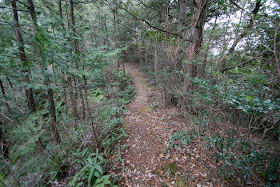












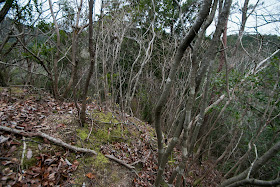





























































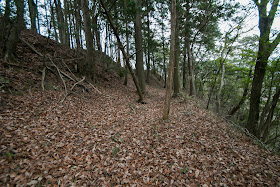

































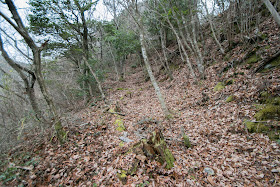


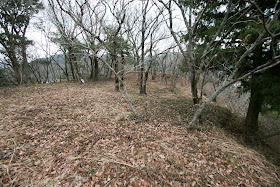







































No comments:
Post a Comment